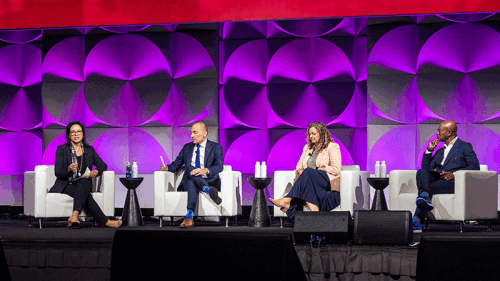The outlook is strong, though some headwinds remain.
This article appeared in the Summer 2022 issue of Urban Land.
Two years after the start of the global pandemic, the outlook for the U.S. hotel industry is decidedly positive. STR, a CoStar Group company and a global leader in hospitality analytics, continues to report ever-improving metrics in the United States. The prospects for the sector are embodied in the following six themes.
1. Leisure demand has been strong, with little price resistance. When international travel shut down in early 2020, travelers stayed closer to home in what was dubbed the great American road trip. What was equally interesting was the immense spending power that leisure travelers brought to bear. Whereas the beginning of the pandemic was characterized by spending on things, there was a quick evolution toward buying experiences, and high-end vacations were at the top of the list.
2. Groups return more quickly than expected. Another positive sign for the hotel industry is the continued increase in group demand. Consumption of group rooms, sold in increments of 10 or more, hit 7.2 million in April 2022—only 1 million rooms below the April 2019 level and a clear indicator of renewed corporate spending on travel. After two years of almost no travel, it is likely that the return to the association and corporate group events serves two purposes: certainly, there are deals to be made and clients to be seen, but maybe just as important, the social interactions that were lacking in Zoom or Teams meetings can be rekindled.
3. Lack of clarity on a return to the office hinders corporate transient demand. Over the past two years, workers have been extremely productive—without going to the office—and now company leaders are rethinking what work in the office and return-to-office models look like. Hybrid work schedules with two or three days in the office seem to be the new norm. But if fewer workers are in the office, it implies that fewer workers can be visited by fellow business travelers. This, in turn, leads to fewer business trips. So, return-to-office plans have a direct impact on individual demand—and while those plans are in flux, so is the outlook for transient travel.
4. Hotel development pipeline slows. The number of rooms under construction continues to decline, all the way to 150,000 in April—down from more than over 210,000 rooms in early 2020. Projects that have broken ground will continue to open, but projects in the final planning stages may be delayed. There are myriad reasons for delays: interest rates have risen and may force the developer to go back to the drawing board to rearrange the capital stack, and it may be difficult to find construction crews in an environment of rampant single- and multifamily development. In addition, the supply chain for items such as doors, refrigerators, and televisions is still disrupted, delaying construction starts.
5. Transaction activity heats up. Hotel real estate is considered an inflation hedge because room leases can be reset nightly. In the high-inflation environment, interest in hotel assets is high. In 2021, the single strongest year ever in transactions was recorded, with over $50 billion in hotel properties sold. Many of these trades were on the high end of the markets, be they casino hotels or leisure resorts, and the deals often fetched record-breaking prices per room. Continued robust investment activity can be expected for the foreseeable future.
6. Lack of workers and higher labor costs keep operators up at night. The main challenge that makes operators nervous is the lack of access to staff. According to the U.S. Bureau of Labor Statistics, the industry is operating with around 300,000 fewer workers now than in early 2020, and wages for line-level employees are rising at a double-digit pace. Also, existing staff members are often asked to work longer hours, leading to a rising number of employees leaving their jobs. No single, simple solution exists to address the labor shortage, but two outcomes are clear: services will have to be cut or adjusted, and wages will rise, putting pressure on owner profits.
After the worst downturn in history, headwinds remain and will force continued vigilance by owners, investors, and operators. But for now, impressive operating results continue to attract capital to the U.S. hotel industry.
JAN FREITAG is national director of hospitality analytics for U.S. CoStar Group and a member of the ULI hotel development product council.


